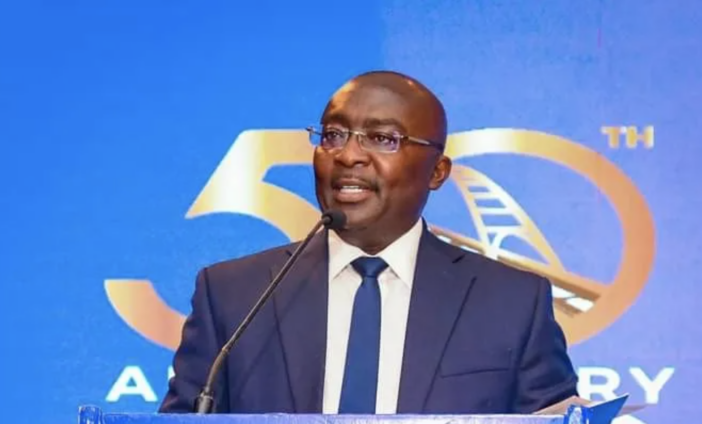Vice President Mahamudu Bawumia has tasked stakeholders in the road infrastructure provision industry to critically evaluate the opportunities in the financing models for funding road construction projects.
That, he said, would go a long way to bridge the huge financing gap within the road construction sector.
The Vice President made the call during the 50th Anniversary launch of the Ghana Highway Authority and High-level Expert Panel Discussion in Accra on Wednesday.
The event was on the theme, “Closing the Financing Gap on Road Infrastructure Development in Ghana”.
Some key stakeholders including road contractors, engineers, financial institutions, and procurement officers deliberated on opportunities and challenges facing the road sector and charted the way forward.
Dr Bawumia noted that road transport was the common means of transporting commuters as well as goods and services in Ghana and called for sustainable ways of financing to maintain the over 94,000 km road network at the optimal level.
Recent estimates indicate that the nation requires $12 billion to clear the maintenance backlog and enable the network of about 94,203km to be at an optimal level.
However, the current funding levels only cover about 38% of the requirement, leaving a significant shortfall.
This gap translates into deteriorating road conditions, increased maintenance costs, and missed economic opportunities.
Globally, the Vice President said, the situation was similar, noting that the African Development Bank reports a continental infrastructure financing gap of between $68 billion and $108 billion annually.
“This staggering figure underscores the importance of innovative solutions and strategic partnerships,” Dr Bawumia stated.
The Vice President pointed out that public-private partnerships (PPPs) offered a viable solution to bridging the financing gap.
“By fostering collaboration between the public sector and private investors, we can unlock new funding streams and leverage expertise in project implementation.
“Successful PPPs have been implemented worldwide, demonstrating their potential to deliver infrastructure projects on time and within budget.
To foster successful partnerships, the Vice President said it was essential to build strong relationships with construction firms, engineering companies, and technology innovators who could provide both financial support and valuable expertise.
“Public-private partnerships (PPPs) are vital for sharing the responsibilities and rewards of infrastructure development. Such collaborations often lead to improved quality of infrastructure and can significantly reduce the burden on public finances, allowing for the reinvestment of savings into other essential areas,” Dr Bawumia stated.
He challenged the participants to explore innovative financing models such as the issuance of Infrastructure and Municipal bonds and reforming the tolling system to ensure equity in its payment.
He stressed the importance of generating sustainable revenue streams for road development and maintenance.
“It is evident that we need to discuss a major paradigm shift in road financing at this technical forum. Some areas you might consider include concessioning of high-volume roads over a period.
“This could be done on major trunk roads like Accra-Kumasi, Accra-Cape Coast, Accra-Akosombo as well new ring roads/ expressways around our major urban centres.
“Congestion pricing, which aims to reduce the entry of low-capacity vehicles into central business districts and encourage the use of high-occupancy vehicles, is also another option,” Dr Bawumia noted.
Discussing what he termed a controversial initiative, Dr Bawumia stated: “I wish to propose a radical reform of the road tolling system in use. We are tolling the poor and leaving the rich and affluent to enjoy. Persons who live in places such as East Legon, Cantonments, Ridge and Labone do not pay any tolls, but they have some of the best roads in Ghana.
Meanwhile people living in Kasoa, those who ply the motorway daily and others who pay tolls do not have these quality roads.
"I propose a major reform of the system, a toll on all drivers and passengers who use the road, irrespective of where they live, to address the concerns about equity and affordability,” Dr Bawumia observed.
Latest Stories
-
SIC Insurance Plc poised for success as it holds its AGM
9 minutes -
“You need to think smarter” – KK Fosu on Fameye’s stage mishap
12 minutes -
LA 2028: Ghana cannot win medal without state support – Bawah Fuseini
15 minutes -
Legon Cities: Paa Kwesi Fabin offers to resign amidst turmoil
17 minutes -
CHAN 2024Q: Black Galaxies ready to match Nigeria for quality
22 minutes -
We want to know who is funding Mahama’s anti-corruption committee – Afenyo-Markin
28 minutes -
Our legendary boxers deserve statues, not Akufo-Addo – Nii Lante Vanderpuye
35 minutes -
We’ll do honest and impartial work – Ablakwa
36 minutes -
Supreme Court dismisses petition against constitutionality of anti-gay bill
46 minutes -
Checkmate: Unpacking the role of ‘Pawn’ in Ghana’s cinema
52 minutes -
CHAN 2024: ‘There is a bright chance of qualification’ – Didi Dramani on Nigeria clash
55 minutes -
CHAN 2024Q: Black Galaxies coach Didi Dramani ‘refining’ players ahead of Nigeria clash
58 minutes -
Medeama appoints Evans Adotey as head coach until end of season
1 hour -
Nebojsa Kapor leaves Medeama following contract expiration
1 hour -
I was told politics is not for ‘Cantata’ people – Actress Ebi Bright
1 hour

